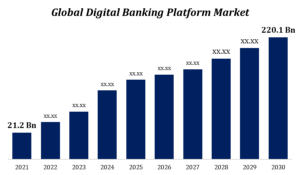Blockchain Technology in Fintech
In the ever-evolving landscape of financial technology, one innovation stands out as a game-changer – Blockchain. Originally conceived as the underlying technology for cryptocurrencies, blockchain has transcended its initial purpose and is reshaping the entire fintech industry. This blog explores the profound impact of blockchain technology on the financial sector, its key features, and the transformative potential it holds for the future of finance.
Understanding Blockchain Technology:
At its core, blockchain is a decentralized and distributed ledger that records transactions across a network of computers. Unlike traditional centralized databases, a blockchain is immutable, transparent, and secure. Each block in the chain contains a timestamped list of transactions, and once added, it cannot be altered. This tamper-proof nature of blockchain ensures trust and accountability in financial transactions.
Key Features of Blockchain in Fintech:
- Decentralization: Blockchain eliminates the need for a central authority, such as a bank or clearinghouse, to validate and oversee transactions. This decentralized model enhances security, reduces the risk of fraud, and promotes trust among users.
- Transparency and Traceability: All transactions on a blockchain are visible to participants in the network. This transparency not only fosters trust but also enables easy traceability of funds, reducing the likelihood of errors or fraudulent activities.
- Smart Contracts: Smart contracts are self-executing contracts with the terms of the agreement directly written into code. They automate and enforce contractual agreements, eliminating the need for intermediaries and reducing the risk of disputes.
- Security: Blockchain employs cryptographic techniques to secure transactions. The decentralized nature of the network and consensus mechanisms make it highly resistant to hacking, ensuring a high level of security for financial transactions.
- Cost Efficiency: By removing intermediaries and streamlining processes, blockchain reduces the costs associated with traditional financial transactions. This cost efficiency is particularly attractive to businesses and individuals seeking more economical financial solutions.
Applications of Blockchain in Fintech:
- Cross-Border Payments: Blockchain facilitates faster and more cost-effective cross-border transactions by eliminating the need for multiple intermediaries and reducing settlement times.
- Trade Finance: Blockchain simplifies and accelerates trade finance processes by providing a secure and transparent platform for documenting and verifying trade transactions.
- Identity Verification: Blockchain can be used for secure and efficient identity verification, reducing the risk of identity theft and fraud in financial transactions.
- Supply Chain Finance: The transparency and traceability of blockchain are leveraged in supply chain finance to monitor and validate the movement of goods, reducing the risk of fraud and ensuring authenticity.
- Tokenization of Assets: Blockchain enables the digitization and tokenization of real-world assets, making it easier to trade and transfer ownership of assets like real estate, art, and commodities.



































Securing a payment gateway for high risk merchants is crucial for the success of your business. High risk merchants often face challenges with traditional payment processors due to the nature of their industry. Specialized payment gateways for high risk merchants provide secure and compliant solutions tailored to their needs. This provider offers a top-rated payment gateway for high risk merchants, ensuring your transactions are processed smoothly and securely. With a reliable payment gateway, you can focus on growing your business without worrying about payment processing issues. Explore the best options for payment gateways for high risk merchants with this trusted provider to ensure secure and efficient transactions.